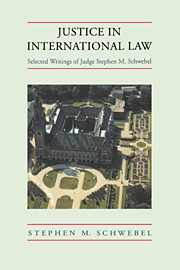Book contents
- Frontmatter
- Contents
- Preface
- PART I International Court of Justice
- PART II International Arbitration
- PART III United Nations
- PART IV International Contracts and Expropriation
- 23 Report of the Committee on Nationalization of Property of the American Branch of the International Law Association
- 24 The Story of the United Nations Declaration on Permanent Sovereignty over Natural Resources
- 25 Speculations on Specific Performance of a Contract between a State and a Foreign National
- 26 On Whether the Breach by a State of a Contract With an Alien is a Breach of International Law
- 27 Some Little-Known Cases on Concessions (with J. Gillis Wetter)
- 28 Commentary on “Social Discipline and the Multinational Enterprise” and “Security of Investment Abroad”
- PART V Aggression under, Compliance with, and Development of International Law
- List of publications
- Index
26 - On Whether the Breach by a State of a Contract With an Alien is a Breach of International Law
Published online by Cambridge University Press: 06 November 2009
- Frontmatter
- Contents
- Preface
- PART I International Court of Justice
- PART II International Arbitration
- PART III United Nations
- PART IV International Contracts and Expropriation
- 23 Report of the Committee on Nationalization of Property of the American Branch of the International Law Association
- 24 The Story of the United Nations Declaration on Permanent Sovereignty over Natural Resources
- 25 Speculations on Specific Performance of a Contract between a State and a Foreign National
- 26 On Whether the Breach by a State of a Contract With an Alien is a Breach of International Law
- 27 Some Little-Known Cases on Concessions (with J. Gillis Wetter)
- 28 Commentary on “Social Discipline and the Multinational Enterprise” and “Security of Investment Abroad”
- PART V Aggression under, Compliance with, and Development of International Law
- List of publications
- Index
Summary
The question of whether the breach by a State of a contract between that State or its agency and an alien is a breach of international law has long divided States and scholars. For example, in the Ambatielos case, the Greek Government maintained that the contract between His Majesty's Government in the United Kingdom and Mr. M.N.E. Ambatielos
was one between a State and a foreign national, with the result that, according to the admitted principles of international law, the Government of the State incurs a direct responsibility on breach of the contract, for which the Government of the foreign national thereby injured is entitled to seek redress.
Greece invoked Professor Borchard's conclusion that:
It is a rule, which it is believed has been accepted generally, that the contracts entered into by a State with foreigners, create obligations which the State must fulfil. With reservations as to the exhaustion of local remedies it will be responsible for the non-execution towards the foreign State.
These contentions were resisted by the British Government. In the Ambatielos proceedings, it maintained that:
It is plain that, according to the well-settled principles of international law, the fact that one party to the contract was a Greek national and the other a department of His Majesty's Government in the United Kingdom, does not entitle the Greek Government, as is suggested in your note, to seek redress on behalf of its national on the ground of breach of contract. […]
- Type
- Chapter
- Information
- Justice in International LawSelected Writings, pp. 425 - 435Publisher: Cambridge University PressPrint publication year: 1994
- 4
- Cited by



